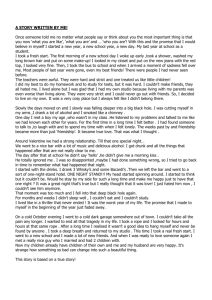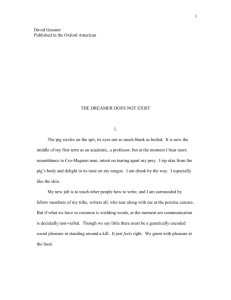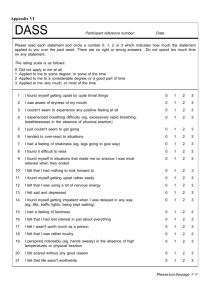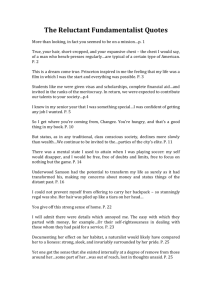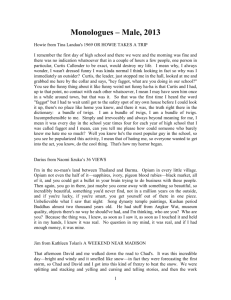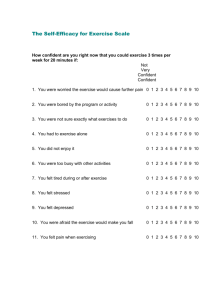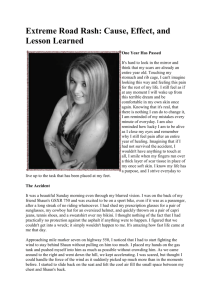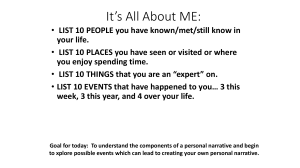The Dreamer Did Not Exist text
advertisement
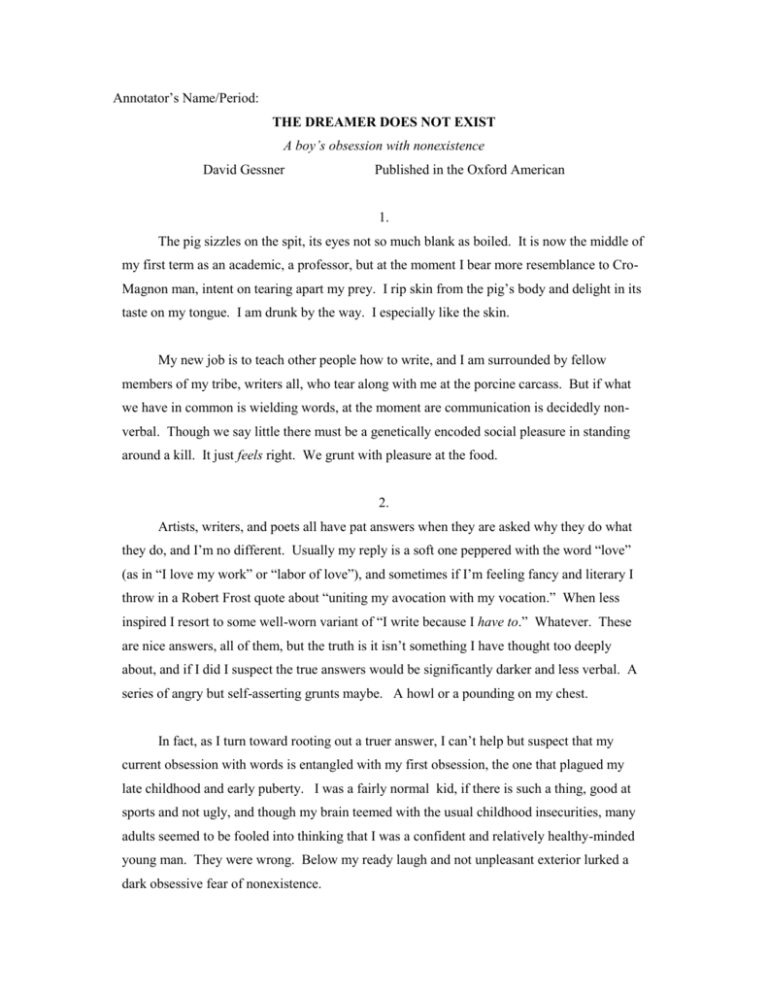
Annotator’s Name/Period: THE DREAMER DOES NOT EXIST A boy’s obsession with nonexistence David Gessner Published in the Oxford American 1. The pig sizzles on the spit, its eyes not so much blank as boiled. It is now the middle of my first term as an academic, a professor, but at the moment I bear more resemblance to CroMagnon man, intent on tearing apart my prey. I rip skin from the pig’s body and delight in its taste on my tongue. I am drunk by the way. I especially like the skin. My new job is to teach other people how to write, and I am surrounded by fellow members of my tribe, writers all, who tear along with me at the porcine carcass. But if what we have in common is wielding words, at the moment are communication is decidedly nonverbal. Though we say little there must be a genetically encoded social pleasure in standing around a kill. It just feels right. We grunt with pleasure at the food. 2. Artists, writers, and poets all have pat answers when they are asked why they do what they do, and I’m no different. Usually my reply is a soft one peppered with the word “love” (as in “I love my work” or “labor of love”), and sometimes if I’m feeling fancy and literary I throw in a Robert Frost quote about “uniting my avocation with my vocation.” When less inspired I resort to some well-worn variant of “I write because I have to.” Whatever. These are nice answers, all of them, but the truth is it isn’t something I have thought too deeply about, and if I did I suspect the true answers would be significantly darker and less verbal. A series of angry but self-asserting grunts maybe. A howl or a pounding on my chest. In fact, as I turn toward rooting out a truer answer, I can’t help but suspect that my current obsession with words is entangled with my first obsession, the one that plagued my late childhood and early puberty. I was a fairly normal kid, if there is such a thing, good at sports and not ugly, and though my brain teemed with the usual childhood insecurities, many adults seemed to be fooled into thinking that I was a confident and relatively healthy-minded young man. They were wrong. Below my ready laugh and not unpleasant exterior lurked a dark obsessive fear of nonexistence. I think I was around 10 when I had my first crisis of being. This was not a Sartre-like intellectual consideration of nothingness that provoked mild nausea, but a visceral sensation that induced something close to real madness. A sudden and overpowering sense that there was nothing in the world: that the world and, more importantly, that I didn't exist. This sensation provoked something wild and strange in me, a pure panic reaction that the child psychiatrist who later observed me described as being like "an LSD user on a bad trip." Not the kind of thing young parents want to hear about their 10-year-old. It all started when my dear dog Macker died. Macker had been my lifelong companion, brought home from the pound the same month I was born. His death was an ugly one: he ate some of the salt that was used to melt the ice on the roads in Worcester, Massachusetts. My mother found him frozen stiff in a snowbank in our backyard. As anxious as I was about my beloved dog's whereabouts, neither my father or mother told me anything about his death for almost a week. They waited because they were worried about my reaction, and as it turned out they had good reason to worry. I flipped out when I finally heard. I couldn't believe that this thing--this horrible cold ending--had happened to my best friend. Even more appalling, as the days passed, was the notion that something similar might one day happen to me. Lots of kids start to worry about death around this age, I understand, but not many begin to truly obsess over it. Lying in bed at night a thought--or more accurately a series of thoughts--would grip hold of my mind. It was these thoughts that would comprise my first full-blown obsession. I called it "the feeling" and though it began with thought it ended in outright panic. It was a little like walking up a mental staircase where each step was more frightening. It all began with the fact of death, but that was just the first step. Next I'd imagine how it felt not to exist at all, and it felt like nothing, as well as nothing I could imagine. But with some effort I would manage to put myself in this state of not-being, and with that I would begin to sweat and grow nervous. At that point I wasn't quite terrified. Not yet. Terror was the next step and with it I left logic behind. In my solipsistic manner I reasoned that if I didn't exist then nothing else did either. It was about then that "the feeling" usually took over. It is impossible to exaggerate the sensation of terror that came over me as I ascended the next step. Suddenly, I was certain at that moment that I did not exist and, equally if not more terrifying, the world did not exist. I was nothing--not even something that might have ever existed. I pounded on my chest to remind myself that I was solid, but it did no good. I reminded myself that I had to exist because I was the one thinking these thoughts, but that didn't help either. I felt like an imaginary wisp, a fleck of nothingness, a passing thought in someone else's mind. Worse, it was as if I were merely a fleeting second in someone's dream, but I was even less than that: the dreamer did not exist. While my logic might have been faulty, the power of what I felt was undeniable. I ran through the house like a lunatic. I had a room on the attic floor and when "the feeling" hit I would sprint down the stairs screaming. Once I picked up a painting and almost smashed it over a chair--after all, it was nothing—only holding back at the last second. Usually the first person I encountered was my sister, Heidi. Heidi and I were close but it still surprised her when her lunatic brother came charging down the hall and hugged her tightly in his arms. I needed to hold something solid, to prove to myself that something did indeed exist, and Heidi usually existed. But even squeezing Heidi like a boa constrictor I couldn't make her feel real to me. I would sprint off to find my mother, then clamp onto her as tightly as I could, trying to find something real. But it didn't work, it never worked. Though she felt substantial enough, I knew the truth, knew she was just another illusion. I tried desperately to explain how I felt as if that would somehow reduce the horror. "Nothing is nothing!" I yelled at first, getting my words mixed up in my panic. "Nothing is nothing!" "Of course nothing is nothing," my mother said with a gentle smile. Couldn't she see the awful truth? Why was she smiling? Was she crazy? "But don't you understand: nothing is nothing!" She smiled again and suddenly I realized my mistake. "Everything is nothing!" I screamed. I wanted these words to strike her with the force of revelation, just as they'd struck me. She, after all, was the person I was closest to, the person I had come from. But I couldn't make her see, no matter how I tried. She would pat me on the shoulder and assure me that it would be all right. But it wouldn't, I knew that, knew that nothing would ever be all right again. One time I had the doubly unpleasant experience of having the "feeling" strike when my father was around. While usually intimidated by him, that day, overwhelmed by my obsession, his presence hardly mattered. He was just another whiff of "nothing" (though, granted, a more substantial whiff.) I charged around, throwing things, screaming, "EVERYTHING IS NOTHING!" (I'd gotten the words down by then.) At first he yelled back, angry, until it finally dawned on him that I was, at that moment, almost completely out of my mind. He looked at the frothing maniac who was his first born. "Calm down, David," he said. "Just calm down." He rapped his knuckles on the coffee table to show me how hard it was. "This isn't nothing," he said. He touched his own burly chest. "I'm not nothing." He had the right idea, I'll give him that. But it didn't help. I stared for one intense second at his puzzled ape-like face. Then I sprinted off down the hallway, screaming and yelling. "David!" he yelled. "David Marshall Gessner you come back here this instant!" I didn't come. He found me out cowering in the garage. "Look, David, just try and calm down--" "You don't understand!" I yelled. He'd had enough. "I understand one thing, my friend. I understand you don't see how lucky you are. Lucky to live in this house, to have food on the table, to have two parents. Do you realize there are millions of children starving and dying of disease?" I looked up at him as if he were the crazy one. "I'd like to be starving or dying right now!" I screamed. And I believed it! Believed that I alone was cursed with this awful understanding, an understanding that made starvation and disease look like child's play. I ran away from him, down the street into the neighborhood. I couldn't listen to him and his logic. Didn't he understand? Everything was nothing! I did not exist! Of course "the feeling" didn't happen every day, but it happened often enough to cause my parents serious worry. It wasn't particularly pleasant for them to suddenly be contemplating turning in my Pop Warner uniform for a straightjacket. Though I tried to convince my mother it would do no good, she finally dragged me off to see a psychiatrist. With the first one I got nowhere, but the second was different. I was twelve or thirteen by then and I folded my arms as I sat up on the couch, convinced that mere words couldn't change "the feeling." "I won't try to 'cure' you," he said. "All I'd like to do is teach you how to relax yourself. So that when you have your 'feeling' you can use these techniques." He was a bearded black man who smoked a pipe and seemed very calm and wise, but deep down I knew mere "techniques" didn't have a chance in hell against "the feeling." Still when he asked me to, I stared at the spot on the wall. "I'm going to hypnotize you, David, but it's not like in the movies. Anytime you want you can come out." I nodded and counted backward. The plan was that, while under hypnosis, he would teach me self-hypnosis. Then, when the feeling came, I would simply calm down. I went along with him, knowing full well that I wasn't about to close my eyes and count backward when the real thing returned. And, just as I guessed, it did return. But then, slowly, mysteriously, it faded. Maybe I was just getting older, growing out of childhood logic, or simply getting used to the idea that I was "nothing." By the time I got to high school I was only experiencing it about once a year, then not at all. I never believed I was cured, (and I still don't, I suppose) but, on the other hand, I have to admit it stopped. Whatever the reason, the feeling finally faded away. 3. The dead pig tastes wonderful and I nod and smile at the other writers. But then, just as I am becoming fully immersed in this mindless pleasure, a grad student of mine begins to talk about God. Which makes me shift uneasily. I’d rather stay focused on pig. One thing I’ve learned about this new place where I find myself is that the air is thick not just with humidity but with religion. There is much talk of the Lord. Just this morning I drove to get my coffee behind a pickup with a bumper sticker that read “Live hard, pray hard.” There are signs like this everywhere (as well as countless flags, both American and Confederate). I am not sure if people are actually any more religious here, in a deep sense, but they are quicker to bring up religion, to display it, to drop Jesus’ name. Of course it’s as easy to be a regionalist as any other kind of bigot so I need to watch myself. The boy keeps talking and I find myself backing away. I mumble a full-mouthed apology and shuffle off to the woods to piss. On the way back I make a detour by the keg. Then, when I see that the god-talker has moved on, I sneak back for another go at the pig. Yes, there is something naturally religious about the sacrifice on the spit, but maybe with more of a pagan flavor. The hog has given us the greatest gift. The unworded must die for the word-makers. I take a long pull on my beer and once again partake of the body.
